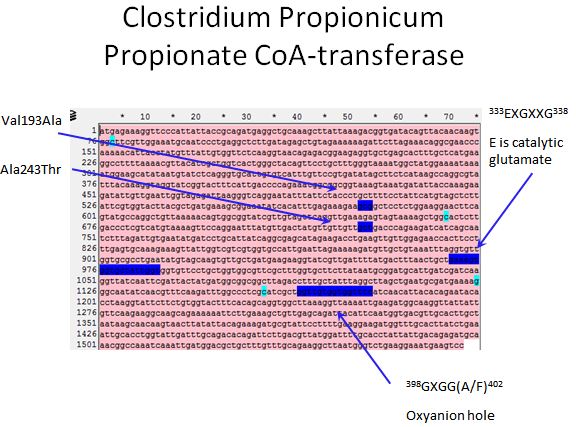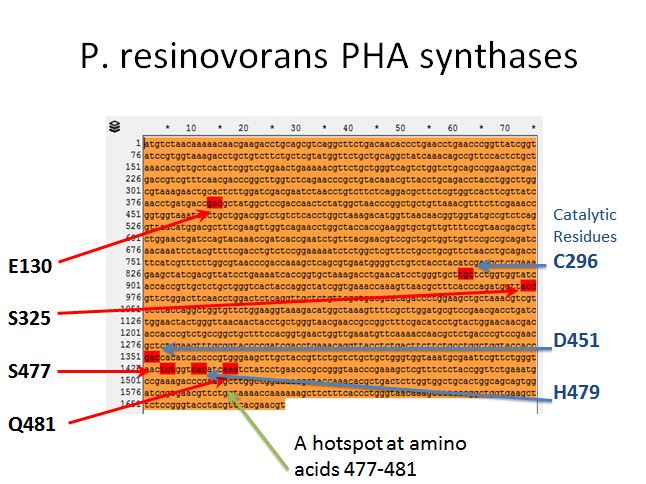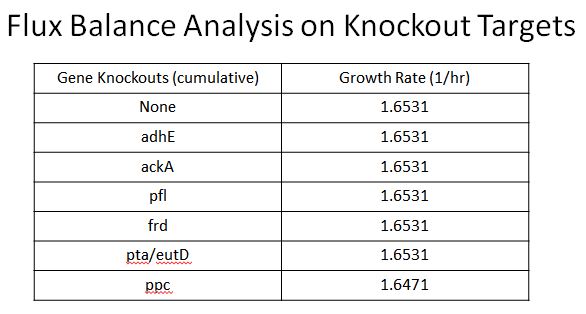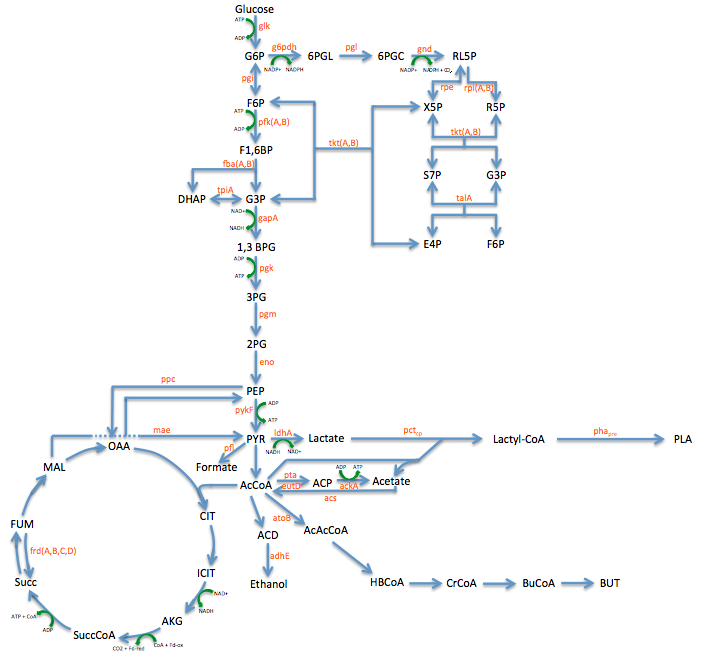Team:Yale/Project MAGE
From 2013.igem.org
(Difference between revisions)
(→MAGE Targets) |
(→Pathway Engineering) |
||
| Line 57: | Line 57: | ||
== Pathway Engineering == | == Pathway Engineering == | ||
*We wanted to divert resources toward our desired pathway | *We wanted to divert resources toward our desired pathway | ||
| - | **This mainly consisted of | + | **This mainly consisted of increasing the production of lactate |
| - | **In order to better understand the pathway we were tampering with we created this | + | **In order to better understand the pathway we were tampering with we created this metabolic engineering graphic (using the sources listed at the bottom of this page) <br> |
[[File:Metabolic Engineering Graphic.png|800px]] | [[File:Metabolic Engineering Graphic.png|800px]] | ||
<br><br> | <br><br> | ||
| Line 82: | Line 82: | ||
**Using the same approach taken in MAGE paper (Wang et al. 2009), we designed oligos that target the RBS of each enzyme, and made the oligos degenerate with the following sequence DDRRRRRDDDD (-4 through -14 positions from the start codon) | **Using the same approach taken in MAGE paper (Wang et al. 2009), we designed oligos that target the RBS of each enzyme, and made the oligos degenerate with the following sequence DDRRRRRDDDD (-4 through -14 positions from the start codon) | ||
**This would alter the RBS to adjust transcription and thus allow some cells to have higher expression and some cells have lower expression | **This would alter the RBS to adjust transcription and thus allow some cells to have higher expression and some cells have lower expression | ||
| - | **Using FACS we would be able to sort through the cells and determine cells have the highest PLA production | + | **Using FACS we would be able to sort through the cells and determine which cells have the highest PLA production |
**The figure shows how to design a oligo depending on which strand and which replichore the gene is located. | **The figure shows how to design a oligo depending on which strand and which replichore the gene is located. | ||
**[https://2013.igem.org/File:RBSTuninglist.png Here is a link to the 20 Enzymes targeted for RBS tuning] | **[https://2013.igem.org/File:RBSTuninglist.png Here is a link to the 20 Enzymes targeted for RBS tuning] | ||
Revision as of 17:28, 13 September 2013
| Project Overview | Validate PLA synthesis | Develop bioassay | Apply MAGE | Introduce export system | Make a bioplastic |
|---|
Contents |
Aims for the Project
- Engineer strains of E. coli for PLA synthesis
- Develop bioassay to screen PLA production
- Apply MAGE to optimize PLA production, guided by FBA
- Introduce type 1 secretion system to export and extract PLA
- Make a bioplastic
MAGE Targets
- The first step in applying MAGE is finding MAGE targets. This involved reading numerous scientific papers to learn as much as possible about the heterologous enzymes, and the pathway that was being used to create the PLA
Enzyme Targets
- Sadly there was no crystal structure of either enzyme we could use to locate the sites to introduce mutations
- However, we used the literature available to locate spots where we would want to introduce mutations
Propionate CoA-transferase
| 
|
P. resinovorans PHA synthases
| 
|
Pathway Engineering
- We wanted to divert resources toward our desired pathway
- This mainly consisted of increasing the production of lactate
- In order to better understand the pathway we were tampering with we created this metabolic engineering graphic (using the sources listed at the bottom of this page)
Enzyme KOs
| 
|
RBS Tuning
| 
|
List of Papers:
Jacob et al. 1997
Matsuzaki et al. 1998
Sawers et al. 1998
Park et al. 2002
Selmer et al. 2002
Takase et al. 2002
Fong et al. 2005
Matsumoto et al. 2005
Rangarajan ES et al. 2005
Matsumoto et al. 2006
Jung et al. 2009
Matsumoto et al. 2009
Juang et al. 2010
Orth et al. 2010
Yang et al. 2011
Kandasamy et al. 2012
Yang et al. 2013
 "
"

